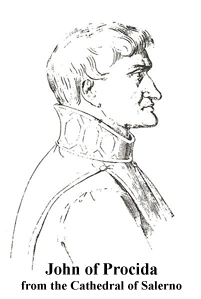John of Procida was born at Salerno to John III, Lord of Procida, in 1210. He was raised at the
Hohenstaufen court of Frederick II in Naples. He graduated from the Scola
Medica at Salerno as a physician and given a professional chair at the university.
He soon became a member of the royal household as
 teacher to Manfred, and physician to Frederick in his last days. More importantly, he would cure
Cardinal Orsini, the future Nicolas III, of a serious ailment. Manfred was so impressed with him
that on assuming the throne of Sicily he made John Chancellor of the realm. Following the Battle of Benevento in 1266
John took advantage of the amnesty Charles of Anjou offered
former Manfred supporters. Pope Clement IV actually recommended him to Charles to be his personal physician.
However, John of Procida soon became dissillusioned with the Angevins and when Conradin invaded
in 1268 John openly supported him. He barely escaped the Battle of Tagliacozzo and fled to
Venice. His lands were siezed and reportedly his wife was beaten and his daugther raped by Angevin knights.
John spent the next several years wandering through Germany and northern Italy trying to drum up support
to overthrow the Angevins with little success.
teacher to Manfred, and physician to Frederick in his last days. More importantly, he would cure
Cardinal Orsini, the future Nicolas III, of a serious ailment. Manfred was so impressed with him
that on assuming the throne of Sicily he made John Chancellor of the realm. Following the Battle of Benevento in 1266
John took advantage of the amnesty Charles of Anjou offered
former Manfred supporters. Pope Clement IV actually recommended him to Charles to be his personal physician.
However, John of Procida soon became dissillusioned with the Angevins and when Conradin invaded
in 1268 John openly supported him. He barely escaped the Battle of Tagliacozzo and fled to
Venice. His lands were siezed and reportedly his wife was beaten and his daugther raped by Angevin knights.
John spent the next several years wandering through Germany and northern Italy trying to drum up support
to overthrow the Angevins with little success.
Sometime around 1275 he moved to Barcelona where he was quickly welcomed into the household of Constance of Aragon, daugther of Manfred. He quickly found a ready audience in the Infante Peter, Constance, Roger of Lauria and the Lancia family, who had fled to Aragon. On ascending the throne, Peter III quickly made John of Procida his chancellor, which put him in charge of Aragonese foreign policy. At this point the chronicles are confusing and even inaccurate, but it is clear that from 1279 up to the election of Pope Martin IV in 1281 that John was involved in trying to entice Emperor Michael of Byzantium and Pope Nicolas III to help Aragon oust Charles. Following that, John actually went to Italy in secret to stir up Ghibelline support.
How much John's machinations influenced the revolt we will never know, but following the invasion of Sicily he was quickly rewarded by being named Grand Chancellor of Sicly on February 2, 1283. He remained active and we find him named in the fleet accounts. He was heavily involved in the Treaty of Anagni, for which he was condemned by the Sicilians. Finally, in 1297 he followed Queen Costanca to Rome for the marriage of Yolande, daughter of Constance and sister of James. The queen stayed in Rome and he remained with her until he died in Rome in 1299.

